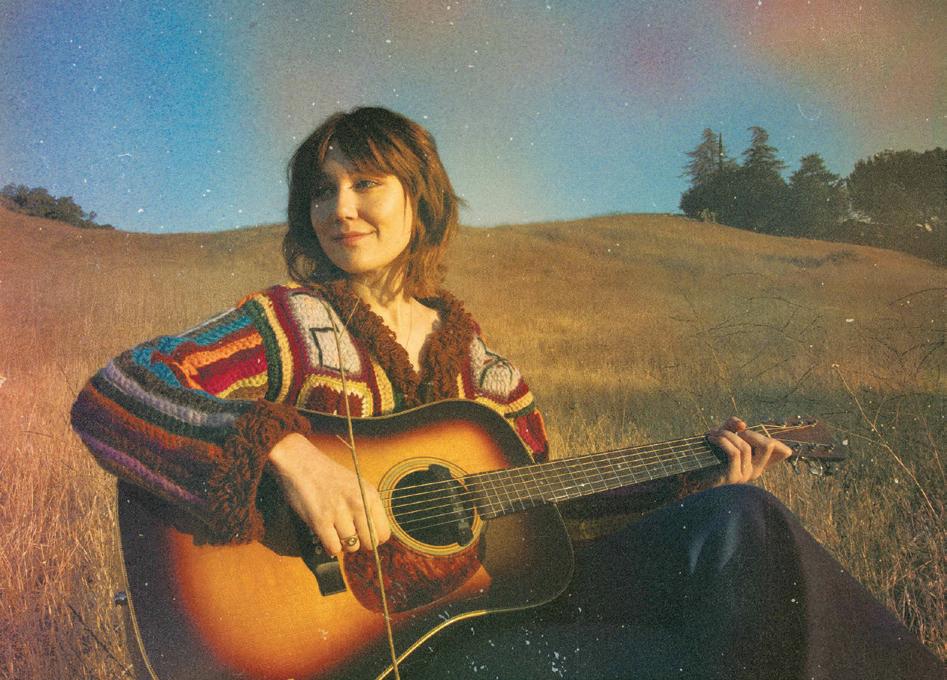
4 minute read
Blurring Boundaries
Molly Tuttle is respectful of tradition but is not bound to it
BY BRETT MILANO
Getting back to her roots proved a winning move for young bluegrass star Molly Tuttle. For much of her career she’s incorporated pop influences and been willing to cover songs from all over the map. But she was determined that her third album, last year’s Crooked Tree, would be a traditionally-styled set. The result is her biggest hit to date, and a bluegrass Grammy this year.
“My life feels about the same after the Grammy, but it does seem like a huge milestone in the career,” she says. That career goes back to the early 2000s, when she joined her family’s bluegrass band and emerged as a prodigy on guitar. She moved to Nashville in her 20s and began a string of eclectic albums that featured a wide range of material and collaborators.
In between she spent a few years in Boston, attending the Berklee College of Music—a place never known as a bluegrass hotbed. “It’s true that a lot of people there are focused pretty heavily on jazz. A lot of students will be learning about jazz theory and maybe applying that to the bluegrass they’re playing. That’s how it was for me—I never felt that I knew about theory, and the study there is on the more complex side of things, so it taught me a lot of basics and concepts that I could apply. Most of my time there was spent playing music with friends, staying home and studying as much as possible. There are times now when I wish I still had time to study, instead of being on the road playing music.”
“When I started making records, I was most interested in staying true to my style as an acoustic, flatpicking guitar player. Then I got interested in seeing what elements I could put into my style to make it unique. With Crooked Tree I started getting nostalgic for when I was growing up, playing bluegrass festivals. My first instinct was to make another contemporary-sounding record, but once I was at home during the pandemic, I started writing a lot of bluegrass songs—and a lot of my favorite musicians weren’t as busy as they usually are. I wanted a record I could enjoy touring for in the next year, so it just kind of flowed.”
Still, the record isn’t entirely traditional. Tuttle remains a dazzling guitarist, and as a lyricist she’s inclined to socially progressive statements. Both “Big Backyard” and the title track are anthems for proud misfits—something she’s often been herself. “That was something important to me, something I’ve had to overcome in my life and something I’ve always wanted to express in my music. I’ve never really felt comfortable writing straight-up bluegrass lyrics; I’m from California so a lot of what Bill Monroe sang about didn’t really resonate with my life.”
The title song is based on her experiences with alopecia areata, something she’s been candid about.
Her condition appeared early in life, causing her to lose most of her hair at age three. At the moment, she gives relatively little thought to whether she’ll wear wigs onstage or not. “It’s something that feels fluid for me. I have worn them for half of my life, but that’s something that’s always evolving. I started wearing them at age 15, mainly because I was tired of being asked why I was always wearing hats. Then I pretty much stopped during the pandemic. I’m naturally an introverted person, so wearing one helps me go through the day uninterrupted. So, the song is really just a statement of who I am. I grew up looking different, but learned to embrace that and it made me stronger.”
Her eclectic taste goes back to preteen years, when she made her first trip to Tower Records and walked out with a Beck CD. But her most famous covers are Rancid’s “Olympia, WA” which she turns into an acoustic stomp, and the Rolling Stones’ “She’s a Rainbow,” which she does without the trademark piano. “It’s a fun challenge and I think some songs work better than others. I’ve always felt there was a crossover between punk rock and bluegrass. I always love learning other instrumental parts and translating them into the kind of crosspicking that I do; and I did that with the piano part in the Stones song. Most of us grew up with what our parents are interested in—I remember trying to get my hands on any CD I could and burn it into my computer. Every new CD I would get was always precious to me. I miss those days when that was always a fun way to discover new music.”
She’s excited to learn that she’s appearing the same weekend as Dead & Co., since the Grateful Dead also play a notable role in her musical history—she recently included two Dead songs, “Dire Wolf” and “Cold Rain & Snow” on the deluxe edition of Crooked Tree and has played a few others live. “We both did a festival in Mexico a couple of years ago. I love the Grateful Dead but I’m a little afraid to say that I’m a fan, because you’re supposed to know the lore and all the different shows. But I also grew up listening to [the Dead bluegrass spinoff] Old and In the Way, and they’re also from the Bay Area so that was special to me.” But no, they haven’t talked about getting together onstage. “We haven’t. But I don’t mind putting it out there.” O
The Soul Rebels plus Wu-Tang Clan

Friday April 28 at 5:40 p.m.
Congo Square Stage
The Soul Rebels
Friday May 5 at 4:25 p.m.
Congo Square Stage










